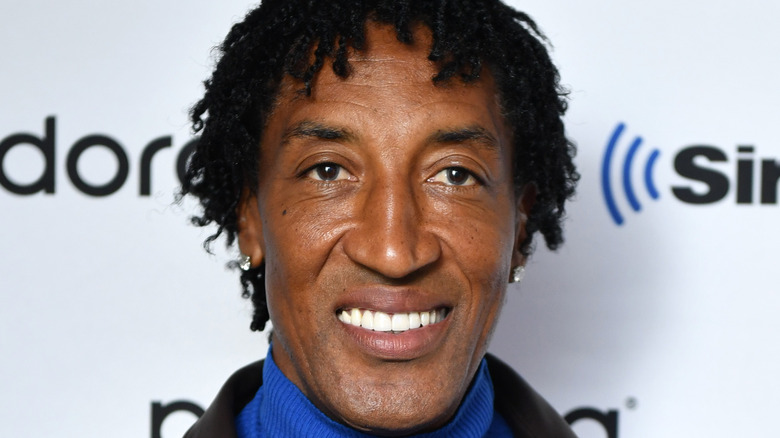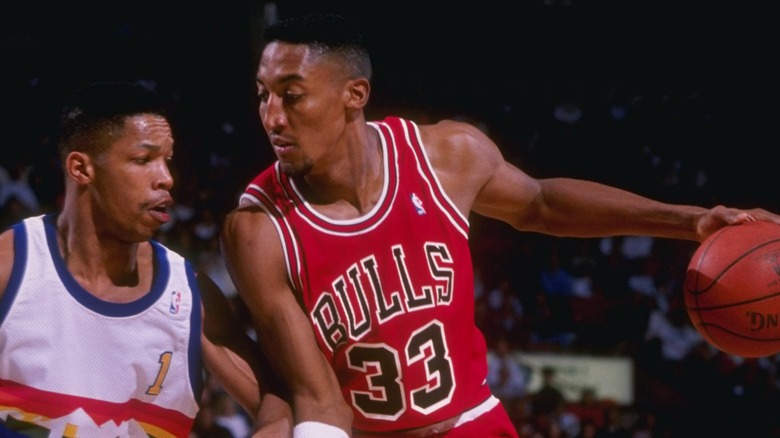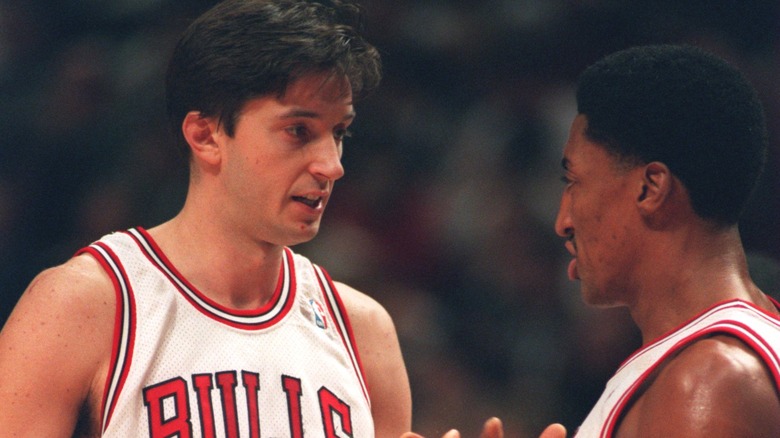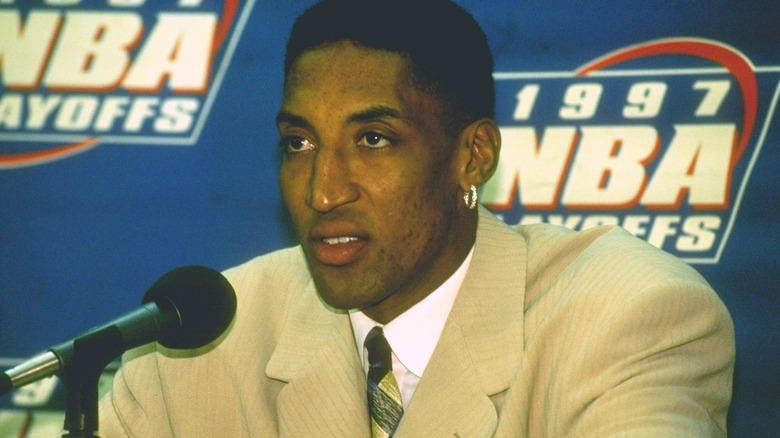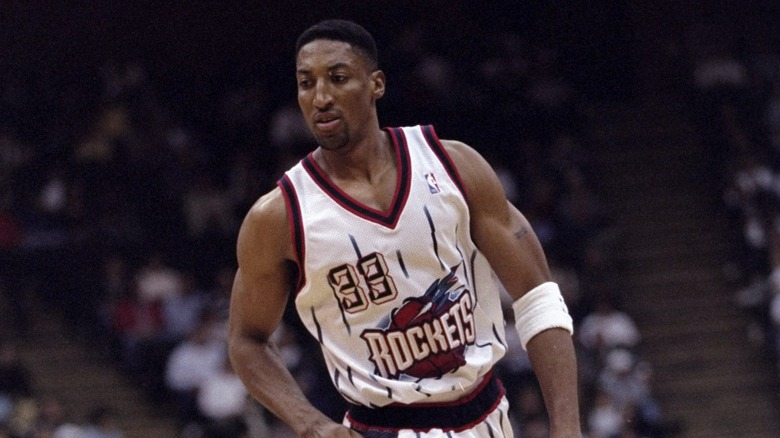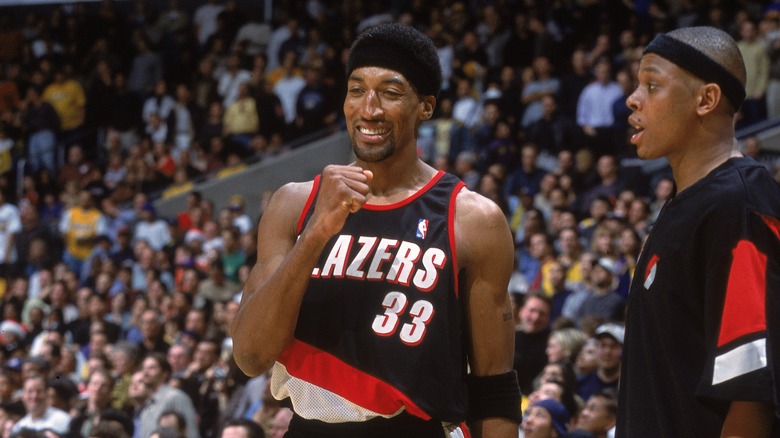Why Did Scottie Pippen Leave The Chicago Bulls?
If Michael Jordan was Batman for the Chicago Bulls, then Scottie Pippen was his Robin. Though he spent most of his 11 seasons with the Bulls playing second fiddle to His Airness, Pippen was a fantastic player in his own right, an all-around contributor with a strong offensive repertoire and an even better defensive game. There's no denying he played a very important role in the Bulls dynasty of the 1990s, and that he deserves his place in the Basketball Hall of Fame as one of the most decorated players of his era. Not bad at all for someone who entered the league out of the University of Central Arkansas, a tiny NAIA school (at that time) that has produced no other NBA players thus far (via Basketball-Reference).
As great as Pippen was with the Bulls, they weren't the only NBA team he played for. After his time in Chicago, he moved on to a pair of Western Conference teams — the Houston Rockets and Portland Trail Blazers — before returning to the Windy City for one last hurrah. But why did Pippen leave the Bulls after all that success he enjoyed with the team? Turns out there are several reasons, not the least of these being the fact he made so little for a superstar-caliber player for much of the 1990s.
Pippen was grossly underpaid
In his first four NBA seasons after getting picked fifth overall in the 1987 draft, Scottie Pippen established himself as an all-around talent at small forward — sure, he was playing on a Chicago Bulls team with Michael Jordan, but he showed early on that he could do almost anything. He was a good scorer and rebounder for his position and an excellent passer and defender who was emerging as Jordan's second-in-command on court. Even better, he was fresh off a championship season with the Bulls — their first of six championships (i.e. two separate three-peats) in the 1990s.
In June 1991, Pippen signed a five-year, $18 million extension with the Bulls that would keep him in the Windy City until 1998 (via the Chicago Tribune). As CBS Sports explained, that didn't sound too bad on the surface. However, the young star's agents, Jimmy Sexton and Kyle Rote, knew something that he didn't, and that was that the deal had a lot of potential to look like a lowball offer a few years down the line. But with Pippen's brother paralyzed due to injuries suffered in a wrestling match and his father disabled following a stroke, he needed the money, so he ignored his agents' warning and signed on the dotted line.
Sure enough, Rote and Sexton's prediction turned out to be accurate, and by the 1997-98 season, Pippen, who was on his way to a sixth championship with Chicago and had since become unquestionably one of the best small forwards (If not the best) in the entire NBA, was the 122nd-highest-paid player in the league and only the sixth-highest-paid player on the Bulls.
The Toni Kukoc situation
Not satisfied with having the NBA's best player and a promising, do-it-all youngster, Jerry Krause, the Chicago Bulls' then-general manager set his sights on the European basketball scene and used a second-round pick in 1990 to draft Croatian standout Toni Kukoc. And while he didn't sign with Chicago until 1993, the Bulls allegedly set aside $2 million in salary-cap space in hopes that he'd agree to play professional basketball in the United States. According to CBS Sports, this compromised the amount of money Scottie Pippen was to earn following his 1991 contract extension, and he wasn't happy about it. It probably didn't help that Kukoc also played the "three" spot and was, just like Pippen, a frontcourt player who could pass the ball like a point guard.
Fast forward to May 1994, and Pippen had momentarily become the Bulls' No. 1 guy with Michael Jordan pursuing a baseball career following his (ultimately short-lived) retirement ahead of the 1993-94 campaign. With the Bulls facing the New York Knicks in the second round of the playoffs, head coach Phil Jackson drew up a play for someone to take the final, potentially game-winning shot in Game 3 of the series. Looking at his 1993-94 numbers alone, he appeared to be the perfect man for the job. But Jackson designed a play for Kukoc to take the last shot, and Pippen was furious over being reduced to inbounding and decoy duties. He wasn't having any of it, and refused to return to the game.
Kukoc did make the game-winner, but it was a Pyrrhic victory for the Bulls, who lost the series to the Knicks in six games and were left in disarray due to Pippen's antics.
He felt insulted by Bulls GM Krause's attempts to trade him
Scottie Pippen's pouting toward the end of Game 3 of the Bulls vs. Knicks series in 1994 also served as a catalyst for a number of near-trades, including one shortly before that year's draft where Pippen was almost traded to the Seattle SuperSonics for a package centered on their star power forward, Shawn Kemp. The deal fell through, though Seattle's then-head coach, George Karl, claimed in his autobiography that Michael Jordan was in his ear, telling him that Pippen could do what Kemp couldn't — make his teammates better. (As an aside, this would have been an ironic trade had it pushed forward, as Pippen was originally drafted by the Sonics before getting traded to Chicago on draft day.)
Ahead of the 1997-98 season, Pippen was a five-time NBA champion and seven-time All-Star, but with his 32nd birthday approaching and the Bulls wanting to get younger, he was on the trading block once again, this time for one of the 1997 NBA Draft's top prospects, high school phenom Tracy McGrady. "T-Mac" himself confirmed this on "The Jump" in 2016 (via Twitter), though as he explained, it was Jordan who put the kibosh on the potential deal. Still, Pippen felt betrayed by Jerry Krause, insulted by the general manager's attempts to ship him to another team. "He tried to make me feel so special, but yet he was still willing to try to trade [me]. He would never tell me that to my face," he said in the Netflix docu-series "The Last Dance." "I felt insulted. I took the attitude of disrespecting him to some degree."
Pippen finally gets traded
As the 1997-98 NBA season started, Scottie Pippen's relationship with Jerry Krause had deteriorated to the point that he was openly mocking the Bulls GM and "[crossing] the line," as Chicago backup center Bill Wennington revealed in "The Last Dance" (via CBS Sports). Pippen officially requested to be traded in November 1997, but as he was recovering from toe surgery and eligible for free agency in the summer of 1998, it seemed that there were few interested suitors, if any at all. As such, he was stuck with the Bulls for the rest of the season, though if anything, he did win his sixth championship as Chicago prepared for what was looking like the end of an era — Michael Jordan retiring a second time, Phil Jackson definitely not returning as head coach, and Pippen preparing for free agency and a likely exit from the Bulls.
Due to the lengthy lockout that reduced the 1998-99 season to just 50 games, it took a while, but Pippen joined the Houston Rockets in January 1999 via a sign-and-trade deal. He signed a new five-year, $67 million contract with the Rockets, and was set to join a star-studded team that featured two other future Hall of Famers in the tail-end of their careers but still very productive – center Hakeem Olajuwon and power forward Charles Barkley. On paper, it seemed like a coup for the two-time NBA champions.
The aftermath: Pippen's numbers took a tumble going forward
Again, it was a great deal on paper — in return for their second-best player during their championship years, the Chicago Bulls got a journeyman-caliber big man who ended up not playing for the team (Roy Rogers) and a future second-round draft pick. But it wasn't like Scottie Pippen was poised for a late-career breakout with his new team. According to his Basketball-Reference page, he averaged just 14.5 points per game for Houston, his lowest since his sophomore pro campaign. (He did, however, contribute significantly elsewhere, averaging 6.5 rebounds, 5.9 assists, and two steals per contest.) Furthermore, Pippen feuded with fellow starting forward Charles Barkley, and after just one season, the former Bulls star wanted out of Houston (via CBS Sports).
Though he reportedly wanted a trade to the Los Angeles Lakers (and a reunion with Phil Jackson), Pippen still found himself playing for a regular Western Conference contender, as he suited up for the Portland Trail Blazers from 1999 to 2003. After that decent run with the talented, yet troublesome "Jail Blazers," Pippen, by that time 38 years old, posting declining numbers, and playing more and more like a guy his age, returned to Chicago for a farewell tour of sorts, playing 23 games (most of them off the bench) for the Bulls in the 2003-04 season.
